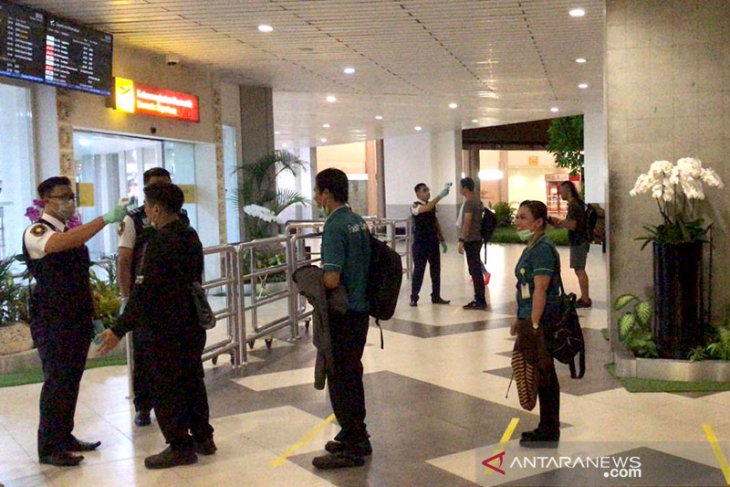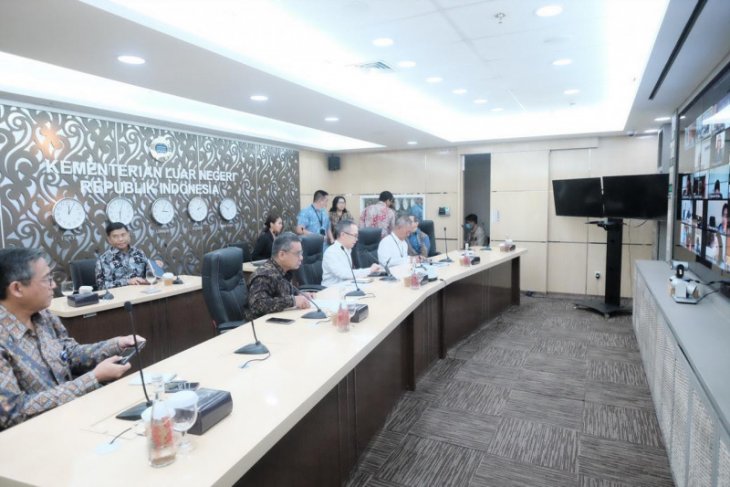Live Streaming
Program Highlight
Company Profile
Government Launches Official Website Furnishing Information on COVID-19
Written by Ani HasanahMarch
PT Angkasa Pura II Applies Social Distancing for Aircraft Passengers
Written by Ani Hasanah
The application of social distancing concept at airports. (ANTARA)
PT Angkasa Pura II is applying the social distancing concept at airports managed by the company to contain the further spread of coronavirus (COVID-19).
Distance-keeping measures are being put in place by optimizing the available space at terminals to create the recommended distance between aircraft passengers, particularly in areas where they gather. The measures encompass placing several yellow lines on the floor, each a meter away, as a marker of queue boundaries for aircraft passengers.
"The yellow lines prompt every passenger to stand within a safe distance at each point in the queue in order to minimize the risk of the COVID-19 spread," President Director of PT Angkasa Pura II, Muhammad Awaluddin, noted in a statement received in Jakarta, Wednesday.
The yellow lines were placed at several areas, including on the floor towards the security check point (SCP), as well as on the fixed bridge and aerobridge floors to maintain a safe distance between passengers boarding the aircraft.
Moreover, a limit has been placed on the number of people boarding each elevator at the passenger terminal. People are advised to not face one another inside elevators and instead look towards the walls and doors.
PT Angkasa Pura II had also rearranged chairs in the boarding lounge to ensure the required distance is maintained between passengers.
Such measures are being applied at several airports, including the Soekarno-Hatta Airport, Depati Amir Airport in Pangkalpinang, Supadio Airport in Pontianak, Kualanamu, and Banyuwangi.
"We have made various efforts to be applied at airports to avert the spread of COVID-19," Awaluddin stated.
Social distancing being practiced at terminals is an additional measure apart from the existing efforts to use disinfectant sprays, adding more hand sanitizers, and checking the body temperature of passengers, earlier applied by PT Angkasa Pura II. (ANTARA)
Shipping Line of Johor-Tanjungpinang Stops Operating
Written by Ani HasanahLockdown policy done by Malaysian government impacted to the Malaysian citizen activities going out to the nearest neighboring country, namely Indonesia, particularly to the Riau Islands region which has direct border with the state of Johor Bahru. The policy is taken as an effort to curb the spread of a new corona virus or Covid-19 in Malaysia. As a result, the shipping lines that so far have been connecting borders between the two countries, one of which is the shipping route of the Johor Bahru Stulang Laut port to the port of Sri Bintan Pura, Tanjung Pinang City, Riau Islands has been forced to stop operating. The Head of the Tanjungpinang Port Authority (KSOP) Mappeati to RRI on Tuesday stated that the termination of the shipping route started on Tuesday at 23:00 West Indonesia Time or 00.00 (zero-zero) Wednesday, March 18 Malaysian time. Therefore, all ship fleets owned by a number of Malaysian operators and local shipping companies have to stop operating. The association further said the suspension of the ship's operation is only for a short time,it will be 14 days ahead. The situation also automatically affect Indonesian citizens from Riau Islands who are currently still in Malaysia. If they have not left the country since Tuesday, they must wait for 2 weeks, then they will get a permission to return to Tanjungpinang, Indonesia.
"If they do not return today, they will return from Johor to (Tanjung) Pinang in the next fourteen days. After that, there will be boats operated. It is not us who stop the operation. It is the Malaysian Prime Minister. But to Singapore, we are still operating," said
Besides the Tanjungpinang-Johor Bahru Malaysia shipping route, the Sri Bintan Pura port of Tanjungpinang also serves a shipping route to Singapore. Tanjungpinang Port Authority also stated that ships to Singapore are still operating regularly until now, because the Singapore authority's policy is different from that of Malaysia's. (VOI/Agus Santika/TRANS:AF/AHM)
March
Vice Minister Apprises Foreign Embassies of Efforts to Check COVID-19
Written by Ani Hasanah
The Indonesian government held a video conference with foreign embassies and international organizations on Tuesday in Jakarta to report on efforts to combat the COVID-19 outbreak. (MoFA)
Indonesian Vice Foreign Minister Mahendra Siregar highlighted the directives issued by President Joko Widodo on COVID-19, including social distancing, in a video conference on Tuesday with more than 100 embassies and international organizations in Jakarta.
Besides Vice Minister Siregar, Deputy Minister of Finance Suahasil Nazara and the government’s spokesperson on COVID-19 matters, Achmad Yurianto, who is also director general of Disease Prevention and Control (Ministry of Health), also participated in the conference.
Siregar outlined the efforts taken by the Ministry of Foreign Affairs, including limiting participation of Indonesian delegations in foreign forums and international activities in Indonesia, scheduling work from home, and launching a COVID-19 hotline for the diplomatic corps.
He also expressed his appreciation of cooperation from friendly countries in efforts to repatriate Indonesian citizens from areas affected by the virus.
Meanwhile, Achmad Yurianto, the government’s spokesperson on COVID-19 matters, stressed that the spread of the virus in Indonesia is under control, and there is coordination between agencies, especially with the formation of a task force to deal with the outbreak.
He explained that Indonesia has adequate resources to deal with outbreaks, with 360 referral hospitals identified, and Community Health Centers and private hospitals optimized to serve all residents, regardless of citizenship status, and ensure early detection.
The Ministry of Health has also heightened communication and coordination efforts with the Ministry of Foreign Affairs to deal with the pandemic. The efforts cover embassies and representative offices of all countries in Indonesia.
At the conference, Deputy Minister of Finance Suahasil Nazara detailed the government's policies and efforts to mitigate the impact of COVID-19 on the Indonesian economy. The government, in cooperation with Bank Indonesia and the Financial Services Authority, has taken a series of synergistic fiscal, monetary, and financial measures, he said.
They include stimulus in the form of tax leniency to help affected industries, including micro, small, and medium enterprises (MSMEs), he added.
The video conference ended with a question-and-answer session, and will be held periodically with the diplomatic corps in Jakarta to apprise them of other developments and strengthen coordination in the fight against COVID-19.




